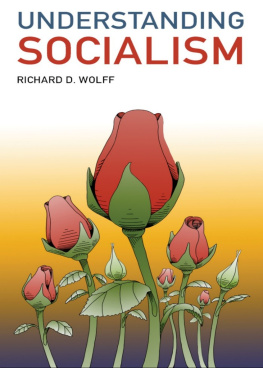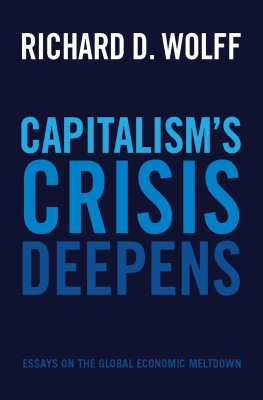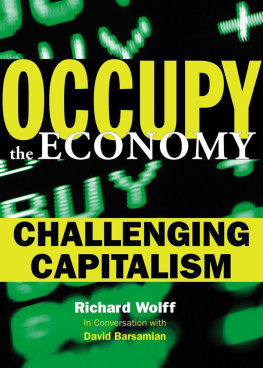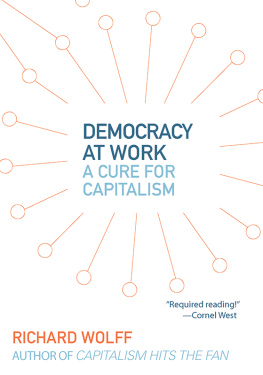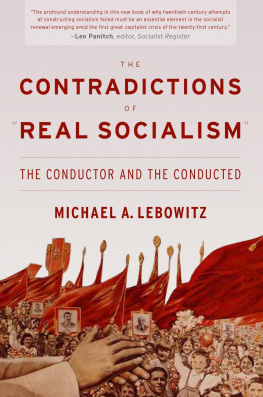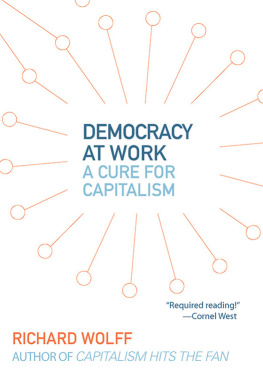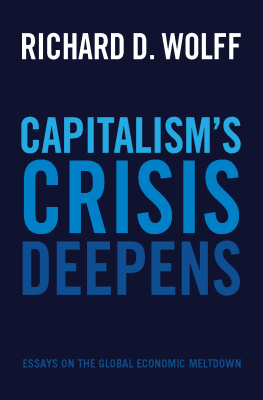Understanding Socialism, by Richard D. Wolff
ePub & Formatting: Daffey
Introduction
Socialism is a kind of yearning for a better life than what capitalism permits for most people. Socialist yearnings are as old as capitalism itself, because they are its products. Where and when capitalism's problems and failings have accumulated criticism and critics, socialist voices have risen. And so it is again now. Any serious discussion of socialism must begin by acknowledging socialism's rich diversity. Whatever particular aspects of socialism we choose to analyze, they need to be located within socialism's complexity. That avoids presenting one's own interpretation as if it were the entirety of socialism. In this book, I focus on the economic aspects of socialism, how it differs from capitalism in broad outlines. I am more interested in socialist critiques of capitalism and their implications about socialist alternatives than in the particulars of the few, early experiments in erecting socialist systems (USSR, People's Republic of China, and so on) that history so
far offers. Finally, my own education and work constrain me to concentrate on Western Europe and North America. Some important aspects of socialism are thus not covered or discussed here. Yearnings for better lives, such as socialism proposes, are not new. In slave societies, the slaves hoped and dreamed of lives less hard and less out of their own control. Their yearning aimed to obtain freedom. They sought social change that would preclude any one person being the property of another. In feudal societies, the serfs "free" in the sense that no one "owned" them yearned for better lives too. Their subordination to lords included heavy labor and other burdens that they wanted lifted. They hoped and dreamed of a society in which they would not be bound to the land, the lord of that land, and the feudal dues of labor and subservience. The serfs mobilized in the 1789 French Revolution to demand liberty, equality, and brotherhood. In effect, the serfs had expanded on what the slaves had called freedom. In the American Revolution against British King George III, the revolutionaries were neither slaves nor serfs. They were mostly self-employed farmers, craftspeople, and merchants subject to a foreign feudal kingdom. Their yearnings thus differed from those of slaves and serfs. They wanted liberty as individuals to pursue their dreams without hindrance from feudalism or monarchism, whether foreign or domestic. They added democracy to the goals advanced by the slaves and serfs before them.
The different systems of slavery, feudalism, and small-scale self-employment produced masses of people yearning for better lives. Eventually, each of those systems provoked revolutions. Many people then sought to break away from and go beyond those systems. The French and American revolutions marked key moments in the social transformations of major pre-capitalist systems into capitalist ones. By "capitalist system" we mean that particular organization of production in which the basic human relation is employer/employee instead of master/slave, lord/serf, or individual self-employment. The revolutionaries who wanted and built capitalism hoped and believed that transitions to employer/employee relations of production would bring with them the liberty, equality, brotherhood, and democracy they yearned for. The revolutions' leaders promised to themselves and to the people they led that those goals would be achieved. But the transitions to capitalist employer/employee relations that increasingly replaced the previous slave, feudal, and self-employment relations of production had unintended consequences. Capitalism soon proved to be different from what its revolutionaries had hoped. While it enabled some people to be more free and more independent than slaves, serfs, or self-employed subjects of monarchies had been, it also seriously limited freedom, independence, and democracy for many. Capitalism betrayed many of the promises made by its advocates. It produced and reproduced great inequalities of income and wealth. Poverty proved to be endemic, as capitalism seemed equally adept at producing and
reproducing both wealth and poverty. The capitalist rich used their wealth to shape and control politics and culture. Democratic forms hid very undemocratic content. The cyclical instability attending capitalism constantly threatened and hurt large numbers, and so on. Growing numbers of employees within capitalism began to yearn for better lives. They defined those yearnings first in the familiar terms of the earlier French and American revolutions: equality, fraternity, liberty, and democracy. They criticized a capitalism that failed to deliver those to most people and demanded social changes to achieve them. Many people still continue to want a better, softer, friendlier capitalism, where government regulates and intervenes to achieve more of what the French and American revolutionaries had yearned for and promised. They often self-define as "socialists." However, capitalism's development provoked another, different perspective that also called itself socialism. In that view, capitalism had not broken from slavery, feudalism, and monarchy nearly as much as its advocates had imagined. Slavery had masters/slaves, feudalism had lords/serfs, and monarchy had kings/subjects as key sources of their inequalities, lack of freedom, oppressions, and conflicts. The employer/employee relation of production in capitalism generated parallel problems. Capitalism installed monarchies inside individual workplaces, even as monarchies outside workplaces were rejected. Kings mostly disappeared, but inside each workplace the owners or their designated boards of directors assumed king-like powers.
Capitalism proclaimed democracy outside workplaces, where people resided, but banned it from inside its workplaces. For some, socialism protests against all the dichotomies: slave/master, serf/lord, subjecting, and employee/employer. It seeks their abolition in favor of democratically self-governing communities of equals. Such socialists insist that democracy applies to the economy as well as to politics. They see no way for politics to be genuinely democratic if it rests on a non-democratic economic basis. The corruption common to all political systems resting on capitalist economies endlessly experienced, regularly exposed, and constantly reproduced is their proof. The inequalities attending all capitalist economies are protected, and thus reproduced, because even a formally democratic politics disproportionately empowers capitalism's employer class. How to concretely organize socialism, and how to achieve transition to it from capitalism, have always been issues of disagreement and debate among socialists. Anyone referring to the socialist position on what constitutes a socialist economy and society, or on how to achieve transition, is making a major mistake. Socialism is more like a tradition of multiple different streams of thought about these questions. The extraordinarily rapid spread of socialism across the globe over the last century and a half brought it to societies with very different histories, economic development, cultures, and so on. Many different interpretations of socialism emerged. Likewise, practical socialist movements over the same period display successes and failures in labor struggles, party politics, and in early efforts to construct socialist economies and societies that also shaped diverse kinds of socialism.
The debates among socialists have sometimes been extreme. Some interpretations view others as outside the tradition, not "real" or "true" socialism. Some interpretations added adjectives to "socialism" to distinguish among the interpretations. Examples include "democratic," "market," "libertarian," "anarcho-," "eco-," "evolutionary," "revolutionary," "Soviet," "Christian," "Utopian," "scientific," "national," "parliamentary," "state," "Stalinist," and more. Socialists never universally accepted or recognized any one authority's definition of socialism. Instead, socialism has always been a tradition of multiple, different, contested streams of thought and practice. We try here to explain when and why we use one or some among socialism's interpretations and when we discuss the tradition as a whole. In the name of socialism, individuals, groups, movements, parties, and governments have sometimes acted in ways that other socialists and non-socialists have found unjustified or even horrific. While the same indictment applies to Christianity, or democracy, or freedom, etc., that is not an excuse. Stalin and Pol Pot are stains on the history of socialism that it must account for and reject. The Spanish Inquisition, missionaries' misdeeds, holy wars against infidels, and countless wars among different interpretations are parallel stains on Christianity. Centuries of colonialism, the slave trade, world war, and mass poverty in the midst of great wealth stain capitalism. Transition from capitalism to one or another kind of socialism does not guarantee that all socialist goals will be achieved or that none will be abused. The abolition of slavery did not mean freedom was achieved and never subsequently abused.

